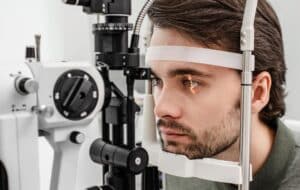Taking care of your eyes is a team effort. When you make an appointment to see an eye doctor, depending on the severity of the issue, you will see one of three types of doctors: an optician, an optometrist, or an ophthalmologist.
Each of these doctors has a different level of training, is qualified in a different area of expertise, and provides different levels of care.
Pacific Eye Clinic knows that some people feel nervous when it comes to getting their eyes seen by a doctor, so we believe in giving you all the information you need to have peace of mind. Taking care of your eyes should always be as stress-free as possible and knowing exactly who you’re seeing when you book an appointment can help with this.
That’s why we’ve created this guide, explaining the different kinds of eye doctors and which one is right for you, depending on your issue.

What Is An Optician?
While opticians are not officially eye doctors and cannot administer eye exams, they are trained technicians able to fit eyeglass lenses, frames, and contact lenses. If you already wear glasses, you have likely come across an optician before. Opticians usually have between 1-3 years of training but cannot diagnose or treat eye conditions.
If you have a prescription from an optometrist or ophthalmologist, you can go to an optician to have glasses or other eyewear fitted.
What Is An Optometrist?
Unlike opticians, an optometrist has trained at a specific optometry school and provides primary vision care. This can involve:
- Conducting eye exams and vision tests
- Detecting some eye irregularities
- Prescribing corrective lenses (glasses, contacts, visual aids)
- Prescribing medication for some eye conditions
- Providing visual rehabilitation
- Diagnosing conditions
- Treating and managing changes in vision
They examine eyes for both vision and health problems, correcting refractive errors by prescribing glasses and contact lenses. For most ordinary vision problems that can be treated with glasses or contact lenses, you will see an optometrist and then an optician. Often these can both be found in local opticians.
Optometrists may also provide pre-and post-operative care if you undergo any surgery on your eyes, which is conducted by an ophthalmologist.
What Is An Ophthalmologist?
To register as an ophthalmologist in Australia, a person needs at least 12 years of education and training to practice surgery.
They offer all of the same services as an optometrist but, with their extensive training, only an ophthalmologist is able to:
- Diagnose and treat ALL eye conditions
- Perform eye surgeries, including services relating to glaucoma, cataracts, diabetic retinopathy, macular degeneration and refractive laser surgery
- Conduct scientific research into causes and cures of eye conditions and vision issues
Ophthalmologists also tend to spend several more years training in a specialist field. The main subspecialty areas are cornea, retina, paediatrics, glaucoma, plastic surgery and neurology. This extra training gives these specialists the capabilities to deal with more complex or severe conditions.
You can go to an ophthalmologist for any condition, especially ones which may be more severe or complex.
Pacific Eye Clinic is a leading ophthalmologist on the Gold Coast. With 20 years of trusted precision and customised surgery, we are the prime choice for your eye health. Get in touch today.
Author

Dr Marc Wei
Dr. Marc Wei is the principal specialist laser and cataract surgeon at Pacific Eye Clinic in Southport on the Gold Coast. He has 20 years of trusted experience in advanced laser cataract surgery and has completed more than 15,000 procedures over the course of his career.


